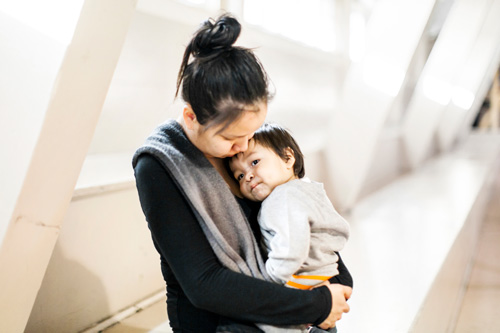A Journey of Personal and Family Wellness
By Kayla Serrato

The nurturing of a new life begins even before pregnancy, as the overall health, living environment and relationships of both a woman and her partner influence the way a baby can develop. Many First Nations communities know this, and are strongly committed to supporting the wellness of women and their role and importance as life givers. When you or someone you love becomes pregnant, it is a major, life-changing event that can inspire positive action and personal growth.

The anticipation of bringing a new baby into the world can especially help adults and Elders who are facing difficult health challenges in life work towards healing, as their concern for a new baby's health is a powerful motivator. One difficult challenge, for example, is a dependency on commercial tobacco, whether smoking cigarettes or chewing tobacco. Reducing or quitting commercial tobacco before or during a pregnancy and maintaining this lifestyle change afterwards can have very beneficial and long-term health and wellness impacts for the whole family.
Benefits for the new baby include:
• Decreased risk of Sudden Infant Death Syndrome (SIDS)
• Increased likelihood of developing and arriving at the expected due date
• Increased likelihood of having a normal birth weight
• Increased likelihood of receiving more and better-quality breast milk
• Increased likelihood of healthier lungs that work better
• Increased oxygen to the body and brain (strong and healthy development)
• Decreased risk of experiencing ear infections, asthma or bronchitis

Benefits for adults and other family members include:
• Increased overall health and wellness
• Decreased risk of chronic diseases like diabetes, cancer and heart disease
• Improved breathing and lung condition
• Improved ability to do physical exercise and take care of your baby
• Increased fertility to continue to grow your family
• Increased personal pride and achievement
• Improved sense of smell and taste
• Increased money savings
The journey to reducing and removing commercial tobacco from your life can be a very difficult and long road. It is important to know it can take many tries to achieve your goal – don't be discouraged, and do connect with friends and family when you need support or help to stay motivated. Your children and grandchildren will thank you for it. It is never too late to quit!
Here are a few things you can try if you or someone you love wants to quit commercial tobacco:
• Think about your motivation for quitting and set a quit date
• Tell your friends and family and ask for their support
• See your health care provider
• Ask about nicotine replacement therapy options and what might work best for you
• Talk to an Elder about the important role of traditional tobacco
• Call HealthLink BC at 8-1-1 for information on local stop smoking programs (e.g.,
FNHA's Tobacco Timeout) or QuitNow by phone at 8-1-1 for free, confidential, no-pressure counselling and support from trained specialists
• Think about ways to help with cravings (e.g., breathing exercises, walks, stretching)
• Think about triggers you might have and how to avoid them – plan ahead
Here are a few ways to help choose and create smoke-free environments for yourself and your baby:
• Ask others not to smoke around you or your baby
• Choose to be in smoke-free places (restaurants, shops, etc.)
• Consider making your home smoke-free by ensuring that no one smokes in the home or in the family vehicle, even when your baby is not a passenger
• Remove all ashtrays or smoking/chew products from the home
• If you or a family member living with you continues to smoke, at least smoke outside and away from the house, wearing a shirt or jacket that can be taken off and left outside or away from your baby and children
The journey towards reducing commercial tobacco use can be long and difficult, but for the health and future of the babies in your life, the effort is worth the reward! For more information, check out HealthLink BC, QuitNow and FNHA's Respecting Tobacco web page.

